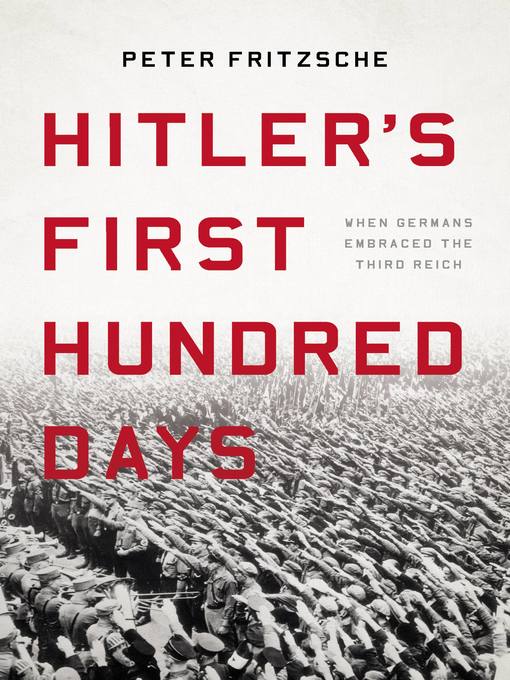
Hitler's First Hundred Days
When Germans Embraced the Third Reich
کتاب های مرتبط
- اطلاعات
- نقد و بررسی
- دیدگاه کاربران
نقد و بررسی

January 1, 2020
Hitler had little trouble destroying German democracy, and this fine history describes how he did it. Fritzsche (History/Univ. of Illinois; An Iron Wind: Europe Under Hitler, 2016, etc.) emphasizes that Germany was a divided, turbulent nation when Hitler became chancellor on Jan. 30, 1933. The Nazis were Germany's largest party, but a series of elections in 1932 showed no groundswell in its favor, and most establishment leaders considered Hitler a loose cannon. President Paul von Hindenburg refused to appoint him chancellor, and Hitler refused to serve under anyone else. It was only when influential conservatives assured Hindenburg that they could control Hitler from subordinate positions in the cabinet that he changed his mind. Even readers who know what followed will not put down Fritzsche's gruesomely fascinating account, as he chronicles how Hitler persuaded Hindenburg to schedule another election and then launched a fierce campaign, using government powers and his own paramilitaries to suppress opposition. The result was not a landslide, but the Nazis and their minor partners controlled just above 50% of the Reichstag. Proclaiming that the nation faced massive communist terrorism, Hitler urged officials to pass an enabling act, giving him dictatorial powers. To achieve the necessary two-thirds vote, he arrested the communist delegates, but in the end, it passed overwhelmingly. By May 9, the 100th day, Nazis had seized the governments of the federal states, dismantled trade unions, passed the first anti-Semitic laws, and destroyed all opposing political parties. Dachau and other new concentration camps quickly filled. In the final chapters, Fritzsche describes Germany over that summer and fall as mass arrests and violence dwindled. In return for enthusiastic devotion, Hitler assured citizens that they were the salt of the earth, that he would crush a despicable elite responsible for their miseries, and that sneering foreigners would realize that Germany was a great nation again. Most Germans found this appealing, and it remains a crowd-pleaser for power-hungry politicians around the world. A painful but expert historical account.
COPYRIGHT(2020) Kirkus Reviews, ALL RIGHTS RESERVED.

January 13, 2020
University of Illinois history professor Fritzsche (An Iron Wind) chronicles the hundred days following Adolf Hitler’s appointment as German Chancellor in this detailed investigation into “the phenomenon of National Socialism.” Opening with a fly-on-the-wall account of the January 1933 meeting in which conservative leaders broke a parliamentary stalemate by elevating Hitler and agreeing to hold new elections, Fritzsche details how Nazis banned opposition newspapers, pitted Aryans against Jews (though he notes that anti-Semitism was already “prevalent”), suspended civil liberties, and “wiped out their adversaries in calculated acts of counterterrorism.” He draws on diaries, memoirs, and news reports to unpack the “apparent sudden shift in national mood” as ordinary Germans eager to experience social cohesion after two decades of war and fractious politics both consented to and were coerced into supporting National Socialism: a Hamburg resident discovers a new “sense of community” in the city’s grittiest districts, while a Dresden teacher can’t prevent her 14-year-old students from singing the Nazi anthem for fear of losing her job. Skillfully interweaving these anecdotal accounts with big-picture analysis, Fritzsche deepens readers’ understanding of how Hitler consolidated power. This is a worthy look at a moment too often hurried through in histories of the period.

Starred review from February 1, 2020
Before a negotiated political arrangement brought the National Socialists (Nazis) to power, Germany was a country with deep economic problems, including high rates of unemployment and inflation. In the first 100 days of Adolf Hitler's appointment as chancellor in 1933, Germany transformed from a troubled democracy to a country that put into practice extreme repression and limitations on personal freedom. Historian and author Fritzsche (history, Univ. of Illinois; An Iron Wind) explains the methods that the Nazi Party used to influence and persuade Germans to embrace Nazism, and the key events in Hitler's first days as chancellor. Using violence, fear, and intimidation, the Nazis created a culture of insiders and outsiders; those who did not support them either passively concurred or almost entirely disappeared from view. Fritzsche successfully weaves in excerpts from letters and interviews, providing firsthand accounts of German people grappling with a new world order. Fritzsche argues that the coup of the Third Reich was getting Germans to see themselves as the Nazis did: as an imperiled people creating national community. VERDICT Everyone concerned about the rise of nationalism, the impact of extreme partisanship, and preserving democracy should read this insightful book.--Beth Dalton, Littleton, CO
Copyright 2020 Library Journal, LLC Used with permission.

























دیدگاه کاربران